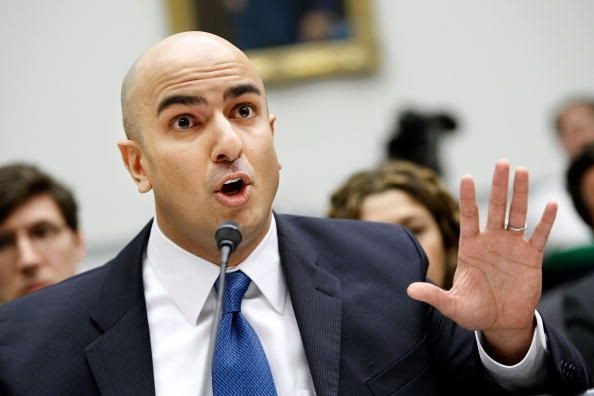Curbing Big Banks Not Political, Fed Official Says

The newest Federal Reserve policymaker dismissed concerns that his call for radical action to rein in "too big to fail" banks was a partisan move, and instead said on Wednesday it highlighted the U.S. central bank's independence from politics.
Minneapolis Fed President Neel Kashkari, a Republican and former Treasury official under the Bush and Obama administrations, said on Tuesday existing rules to protect taxpayers and the economy from a bank failure fall short, and he urged Congress to consider breaking up massive banks.
The call for action seven years after the worst of the financial crisis touched a nerve among bankers and on the combative presidential election campaign, where both Democrats and Republicans have hammered Wall Street greed and criticized regulations as having fallen short.
"I don't see this as a partisan issue," Kashkari said in an interview on Wednesday in which his views on monetary policy were far more muted.
"I do think there are people on both sides of the aisle who care about this issue and think we should take stronger action," he told Reuters. "It wasn't a political statement. It was a statement about economic risks."
Kashkari, a candidate for California governor in 2014 who last month began the Minneapolis job, acknowledged he had not consulted broadly with lawmakers or with his colleagues at the Fed, arguing it was appropriate to go public with his views before getting feedback, to which he "looked forward."
That may be an awkward encounter.
Chair Janet Yellen and others at the central bank have backed the so-called Dodd-Frank reform legislation, adopted in 2010, as having gone a long way to protect the economy from another financial crisis requiring a public bailout.
Bernie Sanders, a Democratic senator and presidential candidate who has tapped into anger toward Wall Street, said on Tuesday he was "delighted" with Kashkari's stance. Asked about this on Wednesday, Kashkari said: "I've never met Senator Sanders and I don't know him and I've never spoken to him. This is not about politics."
'SIGNATURE ISSUE'
Besides Wall Street, the Fed itself has been criticized by Sanders and others running for president for its perceived policy secrecy and too-cozy relationship with banks.
"If we can demonstrate to the American people that there is a diversity of views within the (Fed) and people are outspoken, what better way to demonstrate that we are not political or beholden to the (White House) or any political party," Kashkari said. "I think this shows more independence."
Kashkari was a Goldman Sachs banker before he managed part of the banking and auto bailouts for Treasury during the 2007-2009 crisis. His varied past and populist turns of phrase drew strong reaction to what he told Reuters was his "signature issue early on" in his Fed tenure.
A banking trade group, the Financial Services Forum, said the Fed's own stress tests show the largest banks can now survive a "far worse" crisis than the last, and warned that breaking them up would benefit foreign competitors.
"I think that they are surprised and I expect them to push back pretty hard," Kashkari said of bankers.
Kashkari publicly raised concerns about bank vulnerabilities as far back as 2011. But he said it was only since November, when he was named to the Minneapolis Fed job, that he huddled with its internal experts including policy advisor and author Ron Feldman and decided to propose possibly breaking up the banks.
The Minneapolis Fed directors who selected him for the job last year were not aware he would champion the issue, "and neither was I," he said.
Kashkari was less specific on the question of interest rates, saying markets should focus less on the views of individual Fed officials and more on the central bank's policy-making committee.
He backed the committee's expectation of "gradual" rate hikes and 2 percent inflation over "the medium term," adding he was concerned about low inflation in most major economies.
"I'm not shy about expressing my opinions," he said. "But I also think that having chatter for the sake of having chatter is not necessarily a good thing."
(Reporting by Jonathan Spicer; Additional reporting by Ann Saphir; David Henry and Jennifer Ablan in New York; Editing by Meredith Mazzilli)
© Copyright Thomson Reuters 2024. All rights reserved.







